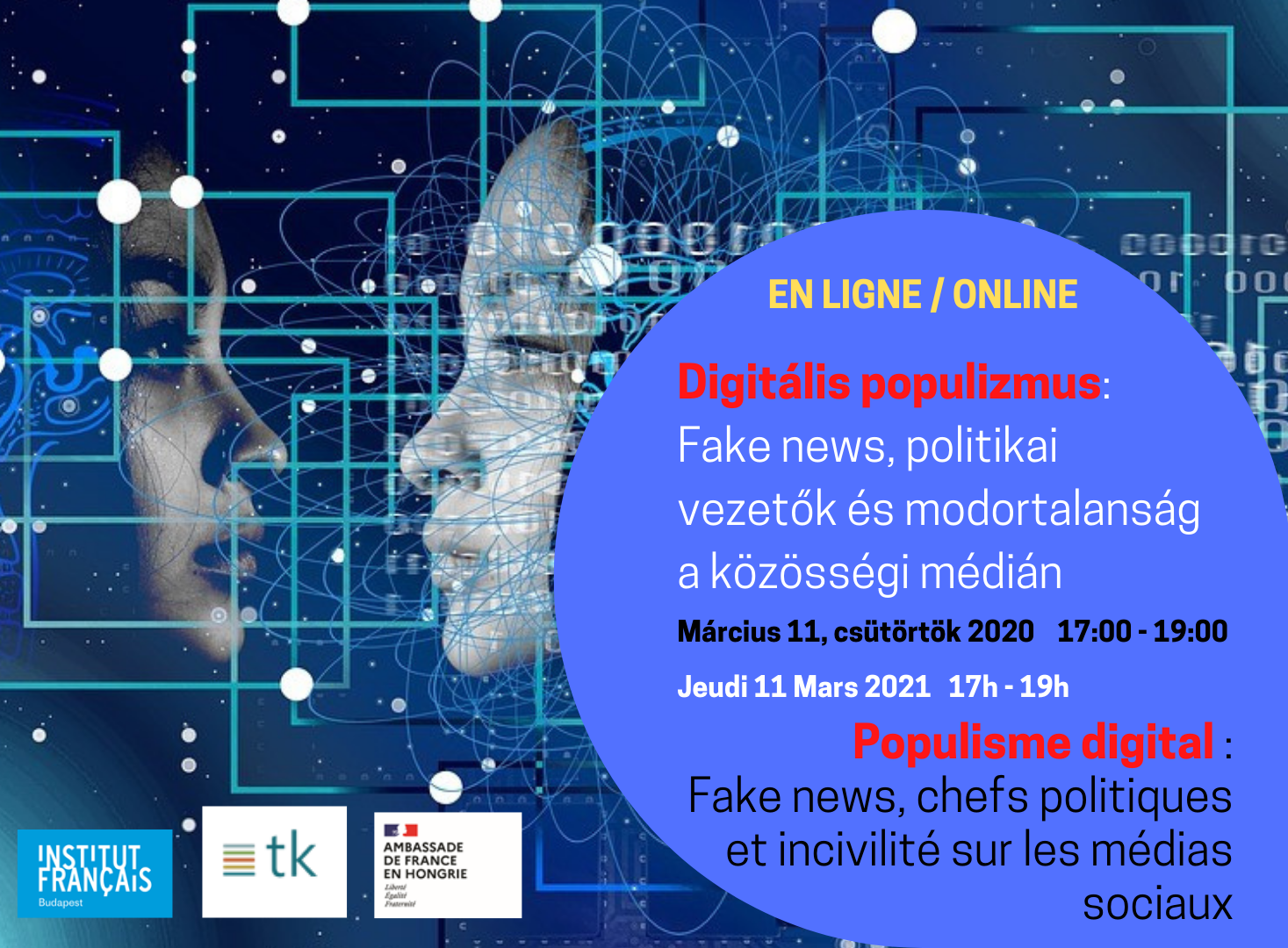Digitális populizmus: fake news, politikai vezetők és modortalanság a közösségi médiában

Webinárium
Minden nap használjuk a közösségi hálózatokat, legyen az eszmecsere, hírek megosztása, vagy akár véleményt kinyilvánítása egy adott témáról: a közösségi hálózatok ma a kommunikáció középpontjában állnak. Az információhoz való hozzáférés egyre gyorsabb, közvetlenebb. De az információk nem mindig igazak, dezinformációhoz és álhírekhez vezetnek. Az információ gyorsan utazik, de nem mindig kerül górcső alá, és torzulhat. Ezeket az álhíreket mindenki átveheti és megoszthatja, beleértve politikusokat is, akik az úgynevezett "digitális populizmus" -ra játszanak. Miért sikeresebb a politikusok egy része a digitális térben, mint mások a kommunikáció terén? Hogyan lehet jellemezni a populista politikusok kommunikációját a közösségi hálózatokon? Igaz-e, hogy a digitális kommunikáció lényegében populista logikával működik?
A konferencia-kerekasztal mellett magyar, lengyel és francia kutatók fogják megvitatni és megpróbálják dekódolni számunkra ezt az új trendet, amely digitális populizmushoz vezethet.
Paneltagok:
• Prof. Nicolas Hubé (Lotaringiai Egyetem)
• Krekó Péter (Political Capital, ELTE PPK Szociálpszichológiai Tanszék)
• Dr. Martin Baloge (Lotaringiai Egyetem)
• Dr. Artur Lipiński (Adam Mickiewicz Egyetem, Poznan)
• Dr. Szabó Gabriella (Társadalomtudományi Kutatóközpont, Budapest)
• A beszélgetést moderálja Prof. Boda Zsolt (Társadalomtudományi Kutatóközpont)
A programot pdf verzióban itt találják. https://www.franciaintezet.hu/.../projet-de-programme-hu...
Szinkrontolmácsolás francia, angol és magyar nyelven
Az esemény ingyenes, de a regisztráció kötelező ezen a linken (100 látogatót tudunk fogadni). https://framaforms.org/populisme-numerique-digitalis...
A regisztrációt követően e-mailben megkapja a webináriumhoz való hozzáférés linkjét.
Populisme numérique : Fake news, chefs politiques et incivilités sur les réseaux sociaux
Wébinaire
Chaque jour, nous utilisons les réseaux sociaux, que ce soit pour communiquer, pour partager l’actualité, ou encore donner notre opinion sur un sujet en particulier : les réseaux sociaux sont aujourd’hui au cœur de notre communication. L’accès à l’information devient plus rapide, plus directe. Mais l’information n’est pas toujours vraie, engendrant désinformation et fake news. L’information va vite, mais n’est pas tout le temps vérifiée, et peut être déformée. Cette fake news peut être reprise et partagée par tout le monde, et notamment les politiciens, qui jouent sur ce que l’on appelle le « populisme numérique ». Pourquoi certains politiciens ont-ils plus de succès dans l’espace digital que d’autres en termes de communication ? Comment caractériser la communication des politiciens populistes sur les réseaux sociaux ? Est-il vrai que la communication digitale a une logique essentiellement populiste ?
Au cours de cette conférence – table ronde, des chercheurs hongrois, polonais et français échangeront et essayeront de décrypter pour nous ces nouvelles tendances pouvant aller vers le populisme numérique.
Avec :
• Prof. Nicolas Hubé (Université de Lorraine)
• Péter Krekó (Political Capital, Département de psychologie sociale de l’Université ELTE PPK)
• Dr. Martin Baloge (Université de Lorraine)
• Dr. Artur Lipiński (Université Adam Mickiewicz, Poznan)
• Dr. Gabriella Szabó (Centre des Sciences Sociales, Budapest)
• La discussion sera modérée par Prof. Zsolt Boda (Centre des Sciences Sociales)
Vous trouverez le programme en pdf ici : https://www.franciaintezet.hu/.../projet-de-programme-hu...
Traduction simultanée en français, anglais et en hongrois
Enregistrement gratuit mais obligatoire en suivant ce lien. Limite de 100 visiteurs https://framaforms.org/populisme-numerique-digitalis...
Suivant votre enregistrement, vous recevrez le lien pour accéder au wébinaire par email.
Digital populism: fake news, political leaders andincivilityon social networks
Webinar
Every day, we use social media to communicate, to share news, to give our opinion on specific subjects: social media became the center of our communication. Access to information is getting faster and more direct. However, information is not always true, leading to disinformation fake news. News and information travel quickly, but are not always verified, and can be distorted. Fake news can be then picked up and shared all around the world, including by politicians who play on what is called “digital populism”. Why some politicians are more successful in the cyberspace compared to others, especially in terms of communication? How to characterize communication by populist politicians on social networks? Is it true that digital communication works with an essentially populist logic?
During this conference - round table, Hungarian, Polish and French researchers will discuss and try to decipher for us these new trends that may lead to digital populism.
Panel members:
• Prof. Nicolas Hubé (University of Lorraine)
• Péter Krekó (Political Capital, Department of Social psychology of ELTE PPK University)
• Dr. Martin Baloge (University of Lorraine)
• Dr. Artur Lipiński (Adam Mickiewicz University, Poznan)
• Dr. Gabriella Szabó (Centre for Social Sciences, Budapest)
• The discussion will be moderated by Prof. Zsolt Boda (Centre for Social Sciences).
You can find the program in pdf here. https://www.franciaintezet.hu/.../projet-de-programme-hu...
Simultaneous translation will be provided in French, English and Hungarian languages.
Access to the event is free of charge, however registration is required at this link. https://framaforms.org/populisme-numerique-digitalis...
You will get the access link to the online event in email after your registration.


